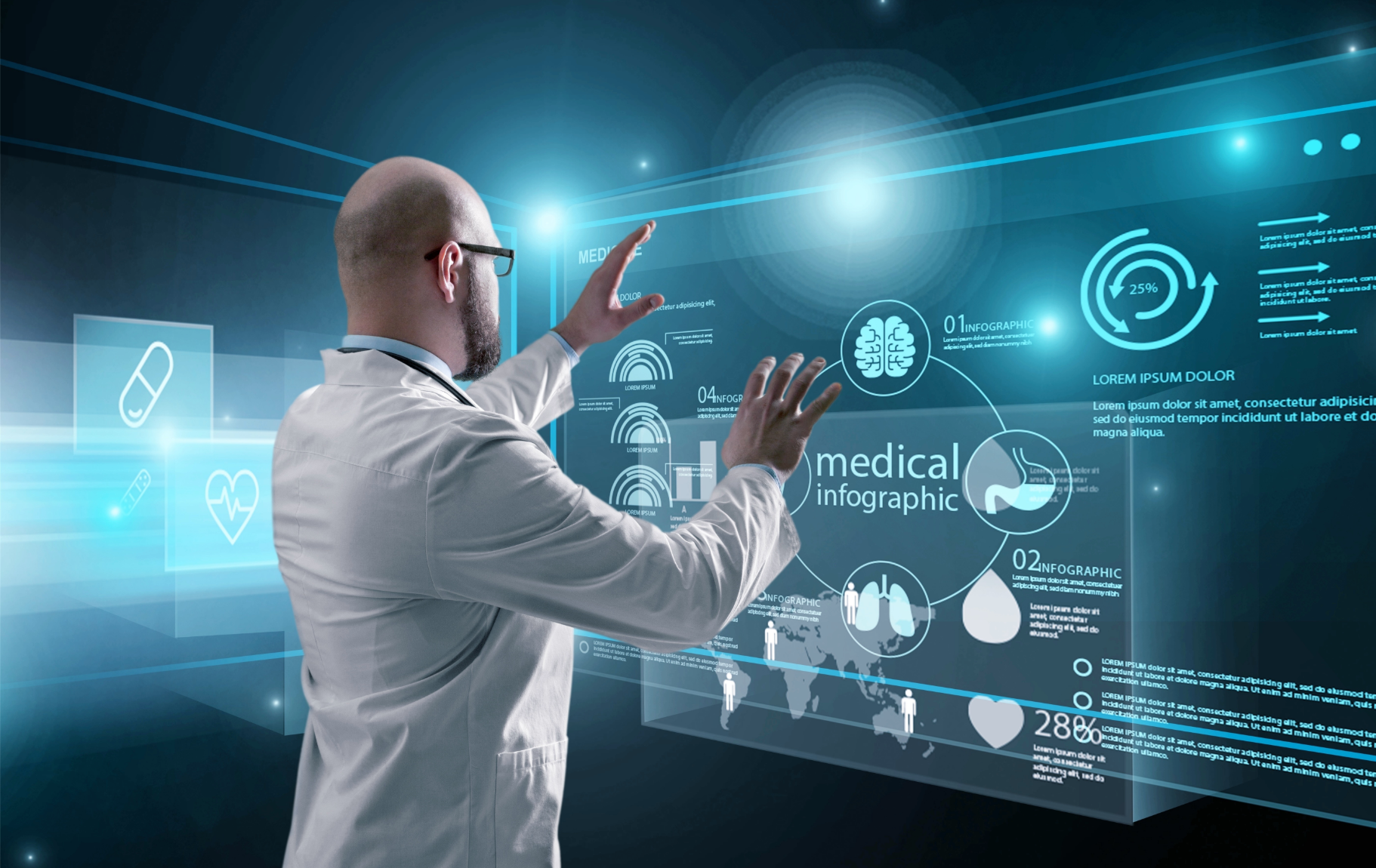Is AI a reliable tool for medical self-diagnosis?

Modern-day challenges demand high speed and accuracy in medical consultation, forcing many people to turn to artificial intelligence. Because AI systems can interpret complaints or suggest diagnoses, we can ask ourselves, ‘Why not try to use such tools for self-diagnosis?’ But how good can they really be?
These tools may help the patient, but they do not substitute for the real medical practitioner. Let’s further explore issues surrounding the issue of being assisted by the AI in your health journey.
The rise of AI in the healthcare industry
AI for healthcare has witnessed rapid expansion, developing into a valuable tool for medical self-diagnosis. Recent advancements in natural language processing enable AI systems, such as ChatGPT, OpenAI, or Google’s Med-PaLM, to analyse symptoms and provide insights that help people seeking to understand their health conditions. Studies reveal that AI can effectively self-diagnose common orthopaedic diseases, offering a glimpse into its potential benefits.
Access to AI enhances patient engagement and triaging processes, making healthcare information more readily available. As the integration of AI in healthcare continues to evolve, with ongoing research, its role in self-diagnosis will likely grow, supporting individual health management. So, when you navigate your health journey, don’t forget to consider the reliable resources available too.
AI-assisted diagnosis
AI for healthcare has gained considerable attention for its ability to assist in medical self-diagnosis. AI-assisted diagnosis tools, such as chatbots and symptom checkers, leverage advanced algorithms and natural language processing to analyse user-inputted symptoms.
Research indicates that these tools often achieve higher accuracy rates compared to traditional online symptom checkers. For instance, OpenAI’s GPT-3 model correctly diagnosed symptoms 88% of the time, significantly outperforming the 51% accuracy noted with conventional methods.
Although AI-assisted diagnosis demonstrates considerable promise, it’s essential to remain cautious regarding its limitations. In some cases, these tools might misinterpret symptoms or provide inaccurate information. Therefore, you should view AI as a complementary resource, enhancing your ability to understand health conditions while always seeking qualified medical advice for conclusive diagnoses.

Medical decision-making
AI tools are increasingly utilised in medical decision-making, particularly in the analysis and interpretation of symptoms. Studies show that AI tools often attain higher accuracy rates in diagnosis than traditional methods, exemplifying their potential impact on healthcare.
However, you should remain aware of the limitations, such as the possibility of misinterpretation. Always note that it can be helpful but cannot replace the nuanced judgement. These tools only use algorithmic analysis, which concerns many factors like creativity, intuition, emotions, feelings, and judgements. So, it can be useful if you only use it for fundamental knowledge and diagnosis of your symptoms.
As AI for healthcare continues to advance, its role in decision-making is likely to become more significant. Services like Cigna Health strategically employ AI to foster better health management for their clients, aiding you in making informed medical decisions.
Pros and cons of using AI for health diagnosis
AI for healthcare offers numerous advantages and presents certain drawbacks. Understanding these aspects aids effective decision-making regarding self-diagnosis.
Pros
-
Accessibility: AI tools provide rapid access to health information, addressing barriers associated with waiting for appointments. Patients can obtain insights into their symptoms without delay.
-
Triaging: AI assists in initial triaging, optimising the allocation of healthcare resources. This efficiency enables healthcare providers to focus on critical cases requiring immediate attention.
-
Enhanced patient engagement and health literacy: AI simplifies complex medical information, making it easier for you to understand and navigate your health. This improvement fosters better health outcomes through informed decision-making.
-
Anonymity: AI tools maintain patient anonymity, encouraging individuals to seek assistance for sensitive health concerns without the fear of stigma.
-
Cost-effectiveness: AI-driven solutions can lower healthcare costs by minimising unnecessary doctor visits and diagnostics. Health plans like Cigna Health recognise these benefits, integrating AI tools to enhance their offerings.
Cons
-
Accuracy concerns: The accuracy of AI-generated diagnoses can vary significantly. AI systems may misinterpret symptoms, leading to potential misdiagnosis and delayed treatment.
-
Algorithmic bias and discrimination: AI systems are only as good as the data they are trained on. If the training data contains biases, the AI may perpetuate or even exacerbate health disparities. This is particularly concerning in healthcare, where biassed algorithms can lead to unequal treatment outcomes for different demographic groups. Ensuring diverse and representative data is crucial for developing fair AI systems.
-
Over-reliance on technology: Relying solely on AI for self-diagnosis can lead to adverse outcomes if serious conditions go undetected. AI should supplement, not replace, professional medical assessment.
-
Limited context understanding: AI lacks the contextual judgement that qualified medical practitioners possess. It may overlook critical information about your health history or unique circumstances.
-
Privacy concerns: While anonymity can be a pro, storing personal health data can create privacy risks. The use of AI in healthcare often involves processing sensitive patient data. Ethical frameworks must prioritise data privacy and security to protect patients from breaches and unauthorised access. This includes ensuring that patients are aware of how their data will be used and obtaining their consent
AI tools can assist in navigating potential symptoms, but they should supplement, not replace, professional medical advice for definitive diagnoses. Exploring AI for healthcare requires a balanced approach, combining technology’s strengths with traditional medical expertise.

Is AI still reliable for medical self diagnosis
AI can be a valuable tool for medical self-diagnosis but it shouldn’t be your sole resource. While it offers quick access to information and can analyse symptoms effectively, it lacks the nuanced understanding that a qualified healthcare professional provides.
Using AI can enhance your health management by offering initial insights and guiding you to seek appropriate care. However it’s crucial to approach its recommendations with caution and always consult a medical expert for a definitive diagnosis. Balancing AI’s capabilities with professional advice ensures you make informed decisions about your health and wellbeing.
How to properly get medical diagnosis with AI
Looking for an health insurance plan with new technology integrated, might be your choice! Cigna’s approach to integrating artificial intelligence (AI) into medical diagnosis offers several advantages that position it as a reliable choice for patients seeking effective healthcare solutions. Here are the key reasons why Cigna stands out in this domain:
1. Advanced AI for preliminary diagnoses
Cigna employs AI algorithms, such as the inference engine and classification algorithms, to make preliminary diagnoses. This technology aids in the appropriate triage of patients, ensuring they receive timely care based on their specific health needs. By utilising AI for initial assessments, Cigna enhances the efficiency and accuracy of the diagnostic process, helping patients navigate their healthcare journeys more effectively.
2. Predictive analytics for chronic conditions
Cigna’s leverages machine learning to predict chronic conditions before they manifest. This proactive approach allows for early intervention and management of diseases such as heart disease, diabetes, and cancer. Anticipating health issues, not only improves patient outcomes but also helps reduce overall healthcare costs.
3. Focus on whole-person health
Cigna emphasises a holistic view of health by utilising data that goes beyond traditional medical metrics. This includes understanding social determinants of health and personal circumstances that may affect a patient’s well-being.
4. Commitment to improving patient outcomes
Cigna’s use of AI and data analytics is geared towards enhancing patient outcomes. For instance, outreach programmes supported by AI have led to significant increases in patient participation in clinical programmes, demonstrating the effectiveness of their AI-driven strategies in real-world scenarios.
5. Regulatory compliance and ethical considerations
Despite facing challenges, including lawsuits regarding the use of AI in claim processing, Cigna is committed to adhering to legal and ethical standards in healthcare. The company is actively working to ensure that its AI systems comply with regulations that mandate thorough and individualised reviews of claims, thereby maintaining trust with its policyholders.
Cigna plans available:
| Plan | Overview | Annual Benefit Limit | Additional Modules |
|---|---|---|---|
| Silver Plan | Core benefits include international inpatient and day-patient cover including hospital stays. | Approx 36,150,000 Thai Baht | Outpatient, Evacuation and Crisis Assistance Plus™, Health and Wellbeing, Vision and Dental |
| Gold Plan | Comprehensive coverage with higher overall annual limits and added benefits including maternity care. | Approx 72,300,000 Thai Baht | Outpatient, Evacuation and Crisis Assistance Plus™, Health and Wellbeing, Vision and Dental |
| Platinum Plan | Highest level of coverage offering an unlimited overall annual limit, with most benefits paid in full. | Paid in full | Outpatient, Evacuation and Crisis Assistance Plus™, Health and Wellbeing, Vision and Dental |
Latest Thailand News
Follow The Thaiger on Google News:


























